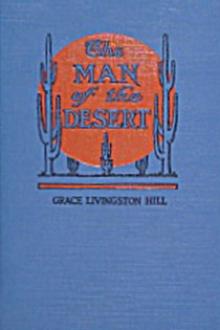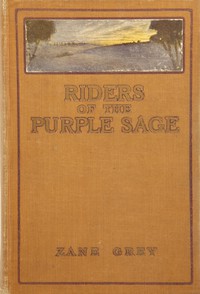The Desert of Wheat, Zane Grey [good non fiction books to read .TXT] 📗

- Author: Zane Grey
Book online «The Desert of Wheat, Zane Grey [good non fiction books to read .TXT] 📗». Author Zane Grey
I saw the sun set in the sea, 'way back toward the western horizon, where the thin, dark line that was land disappeared in the red glow. The wind blows hard. The water is rough, dark gray, and cold. I like the taste of the spray. Our boat rolls heavily and many boys are already sick. I do not imagine the motion will affect me. It is stuffy below-deck. I'll spend what time I can above, where I can see and feel. It was dark just now when I came below. And as I looked out into the windy darkness and strife I was struck by the strangeness of the sea and how it seemed to be like my soul. For a long time I have been looking into my soul, and I find such ceaseless strife, such dark, unlit depths, such chaos. These thoughts and emotions, always with me, keep me from getting close to my comrades. No, not me, but it keeps them away from me. I think they regard me strangely. They all talk of submarines. They are afraid. Some will lose sleep at night. But I never think of a submarine when I gaze out over the tumbling black waters. What I think of, what I am going after, what I need seems far, far away. Always! I am no closer now than when I was at your home. So it has not to do with distance. And Lenore, maybe it has not to do with trenches or Germans.
Wednesday.
It grows harder to get a chance to write and harder for me to express myself. When I could write I have to work or am on duty; when I have a little leisure I am somehow clamped. This old chugging boat beats the waves hour after hour, all day and all night. I can feel the vibration when I'm asleep. Many things happen that would interest you, just the duty and play of the soldiers, for that matter, and the stories I hear going from lip to lip, and the accidents. Oh! so much happens. But all these rush out of my mind the moment I sit down to write. There is something at work in me as vast and heaving as the ocean.
At first I had a fear, a dislike of the ocean. But that is gone. It is indescribable to stand on the open deck at night as we are driving on and on and on—to look up at the grand, silent stars, that know, that understand, yet are somehow merciless—to look out across the starlit, moving sea. Its ceaseless movement at first distressed me; now I feel that it is perpetually moving to try to become still. To seek a level! To find itself! To quiet down to peace! But that will never be. And I think if the ocean is not like the human heart, then what is it like?
This voyage will be good for me. The hard, incessant objective life, the physical life of a soldier, somehow comes to a halt on board ship. And every hour now is immeasurable for me. Whatever the mystery of life, of death, of what drives me, of why I cannot help fight the demon in me, of this thing called war—the certainty is that these dark, strange nights on the sea have given me a hope and faith that the truth is not utterly unattainable.
Sunday.
We're in the danger zone now, with destroyers around us and a cruiser ahead. I am all eyes and ears. I lose sleep at night from thinking so hard. The ship doctor stopped me the other day—studied my face. Then he said: "You're too intense. You think too hard.… Are you afraid?" And I laughed in his face. "Absolutely no!" I told him. "Then forget—and mix with the boys. Play—cut up—fight—do anything but think!" That doctor is a good chap, but he doesn't figure Kurt Dorn if he imagines the Germans can kill me by making me think.
We're nearing France now, and the very air is charged. An aeroplane came out to meet us—welcome us, I guess, and it flew low. The soldiers went wild. I never had such a thrill. That air game would just suit me, if I were fitted for it. But I'm no mechanic. Besides, I'm too big and heavy. My place will be in the front line with a bayonet. Strange how a bayonet fascinates me!
They say we can't write home anything about the war. I'll write you something, whenever I can. Don't be unhappy if you do not hear often—or if my letters cease to come. My heart and my mind are full of you. Whatever comes to me—the training over here—the going to the trenches—the fighting—I shall be safe if only I can remember you.
With love,
Kurt.
Lenore carried that letter in her bosom when she went out to walk in the fields, to go over the old ground she and Kurt had trod hand in hand. From the stone seat above the brook she watched the sunset. All was still except the murmur of the running water, and somehow she could not long bear that. As the light began to shade on the slopes, she faced them, feeling, as always, a strength come to her from their familiar lines. Twilight found her high above the ranch, and absolutely alone. She would have this lonely hour, and then, all her mind and energy must go to what she knew was imperative duty. She would work to the limit of her endurance.
It was an autumn twilight, with a cool wind, gray sky, and sad, barren slopes. The fertile valley seemed half obscured in melancholy haze, and over toward the dim hills beyond night had already fallen. No stars, no moon, no afterglow of sunset illumined the grayness that in this hour seemed prophetic of Lenore's future.
"'Safe!' he said. 'I shall be safe if only I can remember you,'" she whispered to herself, wonderingly. "What did he mean?"
Pondering the thought, she divined it had to do with Dorn's singular spiritual mood. He had gone to lend his body as so much physical brawn, so much weight, to a concerted movement of men, but his mind was apart from a harmony with that. Lenore felt that whatever had been the sacrifice made by Kurt Dorn, it had been passed with his decision to go to war. What she prayed for then was something of his spirit.
Slowly, in the gathering darkness, she descended the long slope. The approaching night seemed sad, with autumn song of insects. All about her breathed faith, from the black hills above, the gray





Comments (0)